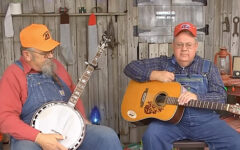
The late Jean Ruth Ritchie was born in the tiny hamlet of Viper, in Perry County, Kentucky, on December 8, 1922, already immersed in the folk music process; that of searching for and the oral handing down of songs.
Ritchie’s paternal grandfather, Austin, was documented by song collector Cecil Sharp in 1917 (as were Jean’s older sisters Una and May). Her father, Balis, was so interested in old songs that he used his own printing press to publish a little song book, Lover’s Melodies.
Jean Ritchie devoted her whole life to collecting and popularizing traditional songs such as Fair Ellender, Shady Grove, I’m Going to Boston, Twilight A-Stealing, and Hush Little Baby. In her illuminating book, Singing Family of the Cumberlands, published in 1955, she described how the folk music heritage was an unbroken part of her family life going back to colonial times.
The Ritchies of Perry County were one of the two great ballad-singing families of Kentucky celebrated among folk song scholars.
The youngest of 14 children, Jean Ritchie became the highest-profiled member of a musically active family. Despite the family’s limited resources, she progressed through elementary and high schools and on into college, enrolling in Cumberland Junior College, and from there going to the University of Kentucky in Lexington, where, in 1946, she graduated with honors earning a BA in social work.
At the University of Kentucky she won the Founder’s Day Award, impressing instructors with her knowledge of folklore and traditional music as well as her skill as an instrumentalist. Ritchie’s playing of the dulcimer was particularly commendable, and later on she awakened considerable interest in the mountain dulcimer from her concerts and festival appearance during the 1950s and 1960s.
Later Ritchie and her husband, George Pickow, a professional photographer and film maker, set up a little workshop and made several hundred dulcimers for sale.
To complete the dulcimer revival, in 1992 she recorded an album called The Most Dulcimer, released to satisfy her fans’ clamoring for an album with the instrument very prominent throughout.
At college Jean Ritchie learned to play the piano, as well as participating in the glee club and other choral activities.
After graduating she got a job as a social worker at the Henry Street Settlement in the Lower East Side neighborhood in Manhattan, New York City. There she taught music to the local children.
While in New York, Ritchie befriended Alan Lomax who recorded her extensively for the Library of Congress.
She got involved with the New York folksong scene and met Leadbelly, Pete Seeger, and Oscar Brand. In 1948 she shared the Spring Fever Hootenanny stage with The Weavers, Woody Guthrie, and Betty Sanders, and by October 1949 was a regular guest on Oscar Brand’s Folksong Festival show on Radio WNYC.
During 1949 and 1950 she recorded several hours of songs, stories and oral history for Lomax.
In 1952 her credentials were impressive enough to enable her to apply for and win a Fulbright Scholarship to trace the links between American ballads and the songs from Britain and Ireland.
During her time in Britain and Ireland Ritchie spent 18 months tape recording and interviewing singers, developing her knowledge of the 300 songs that she already knew from the time she spent in her mother’s lap.
A selection of recordings and some Ritchie renditions of the same songs were released on an album, Field Trip (released in 1954 and re-issued in 2001 on the Greenhays label).
She appeared at London’s Royal Albert Hall, and other concerts for the English Folk Dance and Song Society. Ritchie presented several BBC radio programs and appeared in the Ballad Hunter television series also.
Back in the USA, Ritchie continued to perform in concerts and make records. She sang at the first Newport Folk Festival in 1959 and at the newly emerging college campus festivals, such as the University of Chicago and University of California in Berkeley.
Ritchie became known as “The Mother of Folk” music as she continued to lead the folk music revival into the contemporary era.
During this period Ritchie stayed true to the traditional songs; also she proved to be a good songwriter, using traditional tunes and song forms. Her writing focused on Kentucky-based themes, such as the destruction of the environment by loggers and the strip-mining techniques of coal companies. These songs include Blue Diamond Mines, Black Waters, and The L&N Don’t Stop Here Anymore.
Some of these songs were published using the name “Than Hall,” to avoid troubling her non-political mother, and believing that the songs might be better received if they were perceived to be attributed to a man.
During the 1960s Jean Ritchie was very popular at the many folk festival that were staged throughout the decade. Among them was the Newport Folk Festival where she performed during the inaugural year (1959) and from 1963 through to 1967, inclusive. Not only was she active on stage, she was a busy presence behind the scenes, serving as a member of the Board of Directors and as a member of the Newport Folk Festival Foundation.
Some of her performances at Newport were included in the Vanguard Records festival coverage.
She appeared several times at the events at the University of Chicago and the University of California at Berkeley as well as traditional gatherings in the south and southeast, and at such prestigious venues as Carnegie Hall.
In addition to her Singing Family of the Cumberlands, Ritchie published several books, including The Swapping Song Book, From Fair to Fair, Folk Songs of the Southern Appalachians, Kentucky Mother Goose, The Dulcimer Book, and Dulcimer People.
She released innumerable albums beginning with Traditional Songs of Her Kentucky Mountain Family (1952), Kentucky Mountains Songs (1954), Children’s Songs & Games from the Southern Mountains (1956), The Ritchie Family of Kentucky (1958), British Traditional Ballads, Vol 1 (1961) and British Traditional Ballads, Vol 2 (1961), The Appalachian Dulcimer: An Instructional Record (1963), Jean Ritchie and Doc Watson Live at Folk City (1963), Marching Across the Green Grass & Other American Children’s Game Songs (1968), Jean Ritchie At Home (1974), None But One (1977), O Love Is Teasin’ (1985), Kentucky Christmas, Old and New (1987), The Most Dulcimer (1992) and Mountain Born (1995).
In 2003 Smithsonian Folkways re-issued all of the British Traditional Ballads on one CD.
She was the subject of a documentary film, Mountain Born: The Jean Ritchie Story, which was made in 1996 for Kentucky Educational Television, and is available on DVD (KET).
At its peak Jean Ritchie’s voice has been described as “stunning,” “crystal-clear,” and “bell-like”; the “Lyrical Voice of Appalachia.”
Last year (2014) a tribute album, Dear Jean, featuring Pete Seeger, Judy Collins, Janis Ian, Suzy Boggus, Kathy Mattea, Tim O’Brien, Robin and Linda Williams, Oscar Brand, Dale Ann Bradley, and several more, was released.
In 2002, Ritchie received a National Endowment for the Arts National Heritage Fellowship, the nation’s highest honor in the folk and traditional arts. That same year she was inducted into the Kentucky Music Hall of Fame.
In early December 2009, Ritchie was hospitalized after suffering a stroke and needed speech therapy as part of her rehabilitation program.
Jean Ritchie passed away on June 1, 2015, at her home in Berea, Kentucky.







